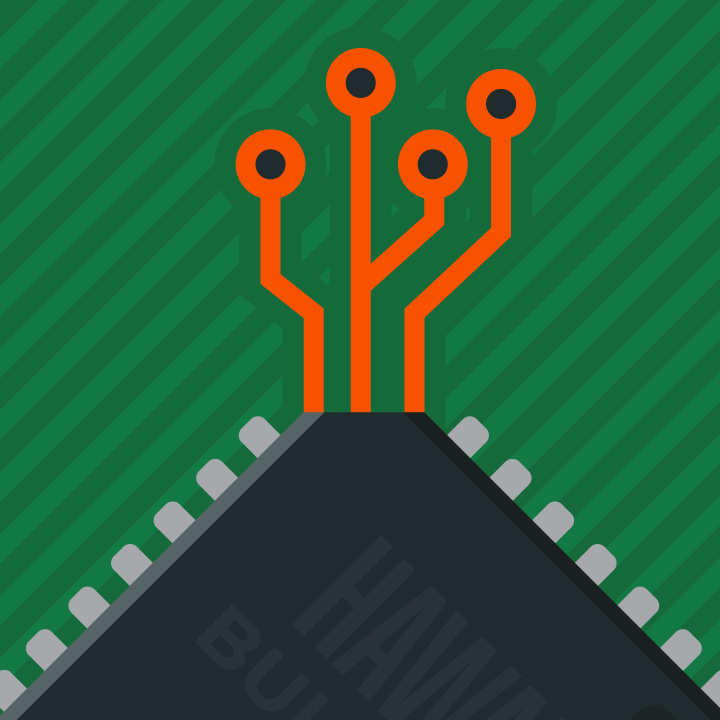
ThriveHI strives to bolster Hawaii tech sector
The group is planning its second 'Talk Story with Tech Pros' event at UH on March 21.
The Tale of Trung
In “Ferris Bueller’s Day Off,” we learn that one Abe Frohman is the “Sausage King of Chicago.” In that vein, I would sometimes describe Trung Lam as the “Bread King of Honolulu.” (Or perhaps the “Fresh Bread Prince”?) I used to joke that the company headquarters—the former Weyerhaeuser box factory on Nimitz Highway—was his castle.
“My parents started Ba-le Sandwiches when I was four years old, so I grew up watching and helping them build their business from a single sandwich shop to a chain of stores and a large commercial bakery,” Lam recalls.
He spent 15 years in the food manufacturing and restaurant space, tapping technology to help his family grow the company into a $20 million a year enterprise and—with his brother Brandon—launching La Tour Cafe, a popular and successful chain of restaurants buoyed by their baking background.
In my mind, he has always been a core member of Hawaii’s next generation of business leaders.
I think we met over a dozen years ago through high school robotics, which was always well-represented at the Hawaii Geek Meet, as he served on the Hawaii VEX Organizing Committee.
His many projects over the years made clear his interest in innovation and community building.
He helped Kalani High School build out a campus makerspace, and thriving robotics and drone racing programs. He started the Hawaii Business Podcast long before I helped Hawaii Business magazine start its podcast. He was part of a winning NASA Space Apps Challenge team that built a coral mapping tool. He got a first-hand taste of startup life as controller for an e-commerce tool called ShopSuey. And as schools scrambled to adapt to the pandemic, he launched KeikiDesk, locally manufactured heavy-duty cardboard desks, and raised enough funds to provide 27,000 of them to Hawaii schools.
Lam became a fixture at Hawaii tech and startup events, and was regularly drawn to opportunities to help others start businesses and to contribute to the community. And last year, he made a big, scary decision: he left the family business.
“Even though we are in the food business, most of my life lessons growing up were more about entrepreneurship and independence,” he said. “During the pandemic, I took a work sabbatical to watch my young kids at home and saw an opportunity to scratch that entrepreneurial itch, and after schools reopened, I decided to make the change of work-life permanent.“
Lam was now able to focus on scale and impact in the community—although business consulting and robotics sales help pay the bills. He’s also open to joining another startup. His new mission?
“I've always been a supporter of the startup and innovation ecosystem here,” Lam said. “I would say I try to have the biggest impact I can have in the lives of those around me,” he said.
The Rise of ThriveHI
Now officially an independent entrepreneur, Lam is focused on building solutions—ideally, solutions to problems that he faces himself.
“I enjoy hearing how people think about solving problems in creative ways and am constantly thinking of new businesses to start with my friends and family,” Lam continued. “Coming up with an idea is easy, but validating it is hard.”
He immediately felt that Hawaii could do more to help the local tech sector. And he discovered others were thinking about the same thing.
“It was very exciting when Rich Matsui, Sonia Romero, and I met, and realized we saw the same new opportunities for Hawaii's tech economy,” Lam recalled. “As much as I love startups, what we need are tech careers that are stable and high wage so that our community can grow and thrive.”
Thanks to the pandemic, one pathway emerged.
“The most obvious change we noticed was the huge influx of remote workers to the islands,” he said. “Some were here temporarily, but others were making Hawaii home permanently, or were returning kama‘aina with remote tech jobs that made it possible for them to come home.”
Lam also saw opportunities in the public sector.
“The increase in federal spending in the islands is also very exciting,” he said. “The Department of Defense is expanding, and increased budgets of other departments means lots of opportunities for the local tech scene to solve challenging government problems at scale.”
So Lam, Matsui, and Romero—later joined by Johnny Chankhamany (who I profiled last summer) and Huiyuan Yang—founded ThriveHI.
“There's so much buzz right now, and we want to be the organization helping folks get in alignment with each other, and help lobby the local government to prioritize high-paying jobs in Hawaii,” Lam said.
ThriveHI is a new and evolving initiative, rather than a business or formal organization, and currently fosters community through networking events and an email newsletter.
“ThriveHI is focused on building a resilient tech economy centered around high-paying jobs,” Lam explained. “Members of ThriveHI will get access to a growing community of like-minded individuals through events, curated volunteer opportunities, and other ways to build deep and lasting connections to the people and places in our community.”
Lam says ThriveHI also expects something in return.
“We want members to be willing to help the community thrive,” he said. “This means providing feedback on challenges they face being a tech worker in a high-cost-of-living area, and it also means offering referrals to local talent for jobs.”
As for recruiting, Lam says ThriveHI naturally welcomes everyone but is designed for a specific demographic.
“We are not trying to be all things for all people, so our target market is tech workers at stable employers invested in Hawaii,” he explained. “That means remote-friendly mainland employers and local companies that are growing and looking for local talent.”
Long term, Lam says he wants ThriveHI to be a truly sustainable effort—not another non-profit organization.
“We want to figure out our business model so we can continue the important work without relying solely on donations or grant funding,” he said.
Meetups and Talkstory Sessions
“We are still trying to understand the landscape better, so all of our events have been networking-focused,” Lam explained. “Our goal is to ramp up the event calendar and try to have something bi-weekly, with some weekend volunteer opportunities with local nonprofits and community groups sprinkled in.”
For now, ThriveHI convenes on the second Wednesday of every month, purposely scheduled for 3:30 in the afternoon to cater to people in Honolulu working on West Coast hours.
“We do a monthly pau hana under the Startup Oahu Meetup group focused on remote tech workers,” Lam said. “In addition to networking events, we want to do some programmatic events like hackathons, pitch nights, and education events.”
One of ThriveHI’s biggest events so far was a “Talk Story with Tech Pros” hosted at the University of Hawaii.
“We brought 30 tech professionals from big-name companies to talk about their careers so students at UH can be exposed to different career tracks and help decide which ones to pursue,” Lam explained. “We had 130 students turn out and it was so well received that we are doing it again this March!”
This second event is taking place on Tuesday, March 21, in collaboration with the Pacific Asian Center for Entrepreneurship (PACE) and the Academy for Creative Media (ACM). ThriveHI aims to draw as many as 200 students plus 30 to 40 professionals to meet with them in small groups. ThriveHI is recruiting volunteers to give advice to future tech and remote workers.
If you are “a techie currently working in Hawaii interested in giving back to the community and excited about meeting some of Hawaii’s best and brightest upcoming talent,” sign up here.
UH event photos courtesy Alyssia Chen/ThriveHI.












